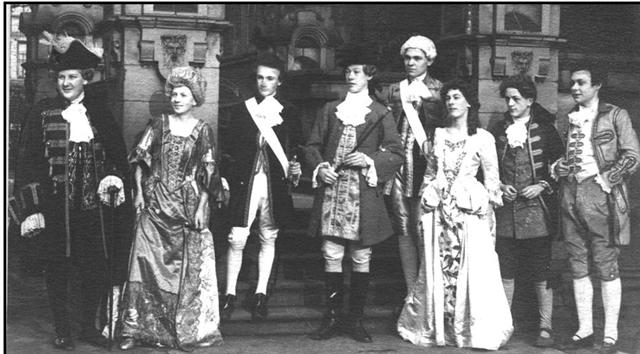Occasionally memories of the pre-war schools have been sent to me. I felt that such memories should be kept. See below.
Jim Briggs
...........................................................................
Submitted January 2006 by John Kelsey 1931-39
James.
Your web site refers to the activities of what seems to have been a soundly based Dramatic Society.
In the 1930’s we were not so well organised. One of the masters, Mr. Herrick, had the sad task of trying to turn us into actors once a year and to show us off in public. By emasculating the plays he hoped to minimise our exposure to outside gaze and he just about got away with it.
I still have my brutally shorn copy of
School for Scandal. It was returned to me.
A big problem was the casting of the female parts. We were not allowed to import girls for the purpose and had to make do with small boys from the lower forms. Some were very good indeed.
The Headmaster tried to attract
well-known speakers for these occasions. Two that I remember were John
Galsworthy in December 1932 and Harold Laski in December 1938.
Read below an extract from a letter I
wrote to a family friend in
“I am enclosing my very dog-eared copy of
The play, as we did it, was a very dull one to act and to watch, whilst the acoustics at the Town Hall only permitted the front 3 rows to hear the actors ( not that the other rows cared, as most of them came prepared with books to read )
However we got more applause than any
other play at Speech Day since Oliver Cromwell in 1932. There was plenty of
action in that, including one duel and a life-like reproduction of the
battle of
I was Sir Peter Teazle and had to wear a white wig, a silver and yellow coat and knee-breeches, a blue and silver waistcoat, white silk stockings (showing exquisite calves), a white lace cravate and a 3-cornered hat trimmed with gold. Total weight = 1 ton approximately
The cost of hiring the costumes for 3 days came to about £50.
The Press reports in the East Ham Echo
and the Stratford Express contained nothing against the play. The Echo had a
page on the speeches and concluded “Entertainment was provided by the
Dramatics Society who played
It was the same in the Express, except they omitted the cast.
As I am scheduled to stay at school until September 1939 I am likely to appear in two more plays ( sounds as though I am earning big money instead of one mouldy binge after each play, doesn’t it ?) with the person who played Sir Oliver.
This person was just built for an old irascible colonel (late Indian Army, retd.) He is inclined to stoutness, has a very bucolic countenance and the drawling accent of a genuine pukka-wallah. He is also a very good actor and has that elusive thing “poisonality” and so next year we are to play a old-fashioned melodrama.
He is to be an old irascible colonel with a beautiful daughter (the boy with the best soprano voice in the 1st. Year. In the last play we had to tie Maria’s knees together, so that he took small steps.) and I am to make my debut as a villain ( + genuine black horse-hair moustaches).
Unfortunately we have no curly-headed,
blue-eyed boy to play the hero.
From the tone of the letter I seem to
have been quite engrossed and I did in fact appear in the Speech Day plays
in the next 2 years. In 1937 I played the dastardly Germanic villain in a
short play called “The Little Man” and in 1938 I played
Sir Lucius O’Trigger in
See the 1938 photograph of this and
admire in particular the “female” lead.
I have the awful recollection that I attempted a gutteral accent in “The Little Man” but I remember hardly anything about it I think it was one of Galsworthy’s short plays. He was very much in vogue at the time. I know that I attempted an Irish accent in “The Rivals”, may God forgive me.
I doubt that I got rave reviews for any
of my performances and perhaps that was a good thing. Otherwise I might have
been tempted to join E.N.S.A.
We had to give 3 full-dress performances of each play. The first two were aimed at the school and at the parents of the junior boys. The third occasion was before honoured guests. It included a special guest, speeches and the prize-giving to those who had left at the end of the previous year.
In 1938 I was Head Boy and had to make
the speech introducing the special guest, Harold Laski from the London
School of Economics before belting behind to get dressed up. He stressed the
importance of a wider education than pure science and gave the Headmaster £5
or £10 as a prize for the boy with the best general knowledge. The price of
a new Pelican paperback was 6d. which meant that even £5 would stock a
modest library.
I was in the 3rd Year Sixth and taking a weird mix of subjects, some Science and some Arts. I was impatient to get my hands on the money. The prize was obviously intended for me. Our Headmaster, E.T Andrews thought differently and at School Assembly the next day he said that it would be invidious to give the money to any one boy, however deserving, and it would therefore be used to augment the school library.
Scoundrel.

......................................................